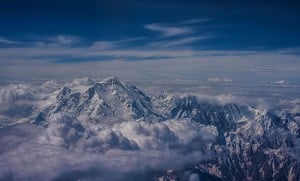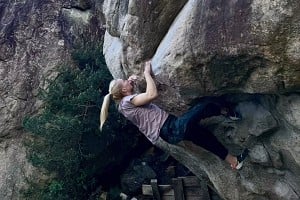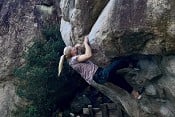
Wasn't sure where to put this one, probably valid for alpine, running, hillwalking etc.
I’m interested in where you get your energy from when carrying out Aerobic exercise in order to improve endurance (not interested in weight loss).
When hiking, I often find I need to carry more food than most. I just seem to crash unless I eat all the time, especially when I was younger, less so these days to be fair. I assume this means I’m not very effective at burning fat, but there may be other reasons. I’m quite slims, so there appears to be a contradiction here (and I don’t have a low fat diet).
I decided to experiment with a heavily weighted 18 mile hike, without breakfast and no food. I know it sounds silly, possibly dumb, but I was never too far from civilisation should I change my mind part way through.
Firstly, I wanted to know if I could do it. Turns out I can, handy to know. Nice little confidence boost.
Second, I wanted to know if by depleting my glycogen stores and forcing me to burn fat, will I get better at it? Will it allow me to preserve more of my glycogen stores when on a hike and therefore give me a feeling of more energy for longer without having to constantly eat? I haven’t got a reliable way to testing this, so I’d like to be educated from those that know.
I can feedback some of my observations if of any interest.
- After about mile 10, all my active muscles started to hurt a bit. More so than I would have expected if I was eating on a similar hike.
- My muscles hurt for longer after my walk. My walk was on Saturday, and my calves and hamstrings are still a bit sore today.
- Towards the end of the walk, I felt like I could go on forever. It hurt, but I didn’t need to stop for anything. When finished, I sat down and my body had just shut down on me. Couldn’t really do anything, it was a shame my toilet was upstairs. Had a bit of food, and a power nap, then felt great after (but achy). I just bounced back. It was all very strange.
So my questions from my little experiment are:
- Did I just do myself harm? If so what? I already know about the achy muscles.
- Did it do any good? If so what?
- Why would hiking hungry lead to achier muscles?
Good experiment, well done. Probably good benefits from being able to go without food and recognise the effects. Not sure about the aches, was the distance/time longer than you currently hike?
In effect you have run a marathon like we did in the old days, before gels and energy drinks - glycogen in the liver was supposed to get you to the wall at 20-22 miles then fat became predominent and there was a risk of 'bonking' if your body was unprepared by training. In normal life fat should be producing most of your energy requirement, when doing tests on a treadmill they look for a respiratory quotient of 0.7 (CO2 ratio) to indicate this. As effort increases glycogen burning increases this figure towards 1.0 - fat and carbs share the load until high levels of effort, and this is trainable.
My son, 32, needs constant food and drink when we are out on the hills; my difficulty has always been the opposite, not wanting or needing either because I am comfortable keeping going - until too late (about 5 hours). We are both training, him to eat less and me to eat more...
> Not sure about the aches, was the distance/time longer than you currently hike?
A little bit longer.
The weekend before I did a roughly 12 mile hike, same weight (15kg on back and 2kg each leg) but it was much steeper ground and I pushed myself quite hard so went quite anaerobic on the hills.
To my surprise no aches the next day, felt wrecked, but muscles were fine (I've been doing quite a bit of training recently).
So I figured this longer 18 mile hike, being less hilly, would overall be easier. So I'm a little surprised how much it broke me and can only assume my muscles didn't appreciate using only fat as a fuel (if there is such a thing as muscles being fussy).
It's a really interesting topic. I probably should have studies Sport Science to be honest.
> So I figured this longer 18 mile hike, being less hilly, would overall be easier. So I'm a little surprised how much it broke me and can only assume my muscles didn't appreciate using only fat as a fuel (if there is such a thing as muscles being fussy).
How do you feel if you do the same hike, but fuelling normally? Is it simply the case that your muscles ache more than the 12 mile because they did 18, not because they got fed fat?
> Is it simply the case that your muscles ache more than the 12 mile because they did 18, not because they got fed fat?
It seems unlikely to me to be entirely due to additional mileage.
When I did the very hilly 12 mile hike my muscles felt fine during and after the hike.
During the less hilly 18 mile hike I started to feel pain by mile 10.
It might just be a different day, different rules, hard to know.
> How do you feel if you do the same hike, but fuelling normally?
I want to give this a try. If I can make the time this weekend I'll report back.
I don't think you did any harm at all.
Becoming better at burning fat can only be a good thing for endurance.
I don't know about achier muscles.
I eat one meal a day and normally train fasted (no food before and during). Am old and slow. Would like to do Edale Skyline in as close to 4 hours as I can, that is 20 miles or so with up and down, so training is geared to that. I eat minimal carbs and that works well for me.
My thoughts we've evolved from primates over the last 1.5 million years, only for the last 40 or 50 years have we had surplus food. Your body is genetically hardwired to not lose weight, the brain subconsciously will generate all kinds of signals to stop us losing fat. Be it cravings to eat, pain, hunger pangs, feeling rubbish etc..what you've discovered is that with willpower you can push through all of these.
On long endurance events nobody eats enough to supply their needs, it's neither practical to carry it or digest sufficient, but if you eat well before your liver has enough ready to do a marathon, if working steadily your body will convert a bit of fat to energy, plus snack a little, I'll you have to do is become accustomed to how you feel when you start to push the limits. Nobody will feel the same at the same point.
I'd say hydration is the biggest factor, stay hydrated even if not eating much, just a small drop in body fluids, results in a proportionally much bigger loss in performance.
Good post. I'd say all hunger urges come from the brain. Which doesn't have suitable sensors to know if food is required.
This might be interesting, but it's a big subject.
https://uphillathlete.com/muscular-endurance-for-mountain-athletes/
Basically your muscles ached more as they were not able , in your current trained state, to do that work , without food, without being damaged and becoming sore.
You certainly can get benefits from training fasted, in terms of developing your body's ability to use different metabolic pathways for fuel.
Whether it's of benefit to you individually will depend on where you're at, what your goals are and who you believe.
There's lots of discussion of this in long distance triathlon and two schools of thought - some people think training to use quickly consumed fuel and then fuelling well when you need to perform will be the best strategy for success, and others think training to use fat will win out as you'll learn to perform efficiently at all times, and don't have to worry about GI distress and what have you.
Back when I was fit, I went out in the Alps a couple of times with a cyclist who would take two cans of coke for a four hour hard ride and blow me away on every climb. That kinda blew my mind as to where you can get to with fasted training.
But personally, I used to do fasted training in the mornings, and fuelled training at other times of the day - I figured that as a very much amateur athlete it was probably healthiest to have a good balance of training both metabolic pathways.
Interesting.
My main experience of training fasted is cycling to work in the mornings - 11 miles over maybe 40 mins. I don't like to do that on a full stomach, so will only have some orange juice (mainly for the hydration) and maybe steal a bite of my wife's toast on the way out of the door.
I'll then have breakfast (and a shower!) at work.
Was a bit hard at first, but soon got used to it. Carried an emergency snack of some sort in my bag, but haven't (yet) needed it.
> My main experience of training fasted is cycling to work in the mornings - 11 miles over maybe 40 mins. I don't like to do that on a full stomach...Was a bit hard at first, but soon got used to it.
Snap! I’m not sure how deeply this translates to other things, but I can certainly walk for a few hours in the hills without seeming to need food (or even want it, particularly) now. That’s a fairly gentle pace, mind. If I’m chugging along a bit harder I’ll try to remember to take more to eat - on foot or bike
> My thoughts we've evolved from primates over the last 1.5 million years, only for the last 40 or 50 years have we had surplus food. Your body is genetically hardwired to not lose weight, the brain subconsciously will generate all kinds of signals to stop us losing fat. Be it cravings to eat, pain, hunger pangs, feeling rubbish etc..what you've discovered is that with willpower you can push through all of these.
> On long endurance events nobody eats enough to supply their needs, it's neither practical to carry it or digest sufficient, but if you eat well before your liver has enough ready to do a marathon, if working steadily your body will convert a bit of fat to energy, plus snack a little, I'll you have to do is become accustomed to how you feel when you start to push the limits. Nobody will feel the same at the same point.
> I'd say hydration is the biggest factor, stay hydrated even if not eating much, just a small drop in body fluids, results in a proportionally much bigger loss in performance.
Exactly, there are sports where eating or drinking are basically out of the question. When I raced enduro we had a trainer from the USA who looked after the Yamaha motocross riders there. He was smart enough to know we were going to race for six or eight hours and do the same the next day. Eating and drinking any substantial amount before or during the race was the quick route to vomiting so you had to pack the 6-8,000 calories in the days before. One of my team-mates was a triathlete and was continously bollocked for having too low a body fat level, each sport has it's own dietary needs and reacting to hunger and thirst is a poor way to go.
> Did it do any good? If so what?
Fasted cardio is a surprisingly complex topic. Despite the logical appeal, the data are equivocal. Some studies have shown increased (relative) fat oxidation during fasted cardio where other studies have shown increased VO2 and substrate uptake (including fat) in fed cardio activity. It seems energy substrate can't be quite so easily dictated. Furthermore one interventional study I saw a while ago on the topic showed their fasted group to have quite markedly decreased performance compared with the fed group.
> Did I just do myself harm? If so what? I already know about the achy muscles.
In terms of health, muscle mass is absolutely a good thing, and it makes sense to at least preserve if not actively develop the muscle we have. Unfortunately one of the effects of fasted cardio does seem to be increased catabolic activity leading to muscle loss. The reason is that in a fasted state protein as a substrate may be more easily metabolised than fat. That *might* be a good thing for your sport and goals, but it's usually not.
> Why would hiking hungry lead to achier muscles?
Like delayed onset muscle soreness (which occurs a period of hours to days post-exercise) this is a slightly tricky one to unpick. But glycogen is absolutely the preferred substrate in above-baseline aerobic metabolism, and in relatively short bouts of sustained effort. The fact of the muscles and liver being depleted of this substrate yet continue in above-baseline activity for an extended period (and the increased work involved in your body's subsequent consumption of both muscle and fat) is very likely to be the root cause.
For me, I always advise people to train for their goals. If you're taking part in a race such as the one described above where eating is out of the question I would totally understand you wanting to improve your body's ability to utilise fat.
if your goal here is fat loss though, you are probably barking up the wrong tree. A consensus is emerging that exercise as a whole (never mind modifications to exercise such as fasted cardio) plays a minor role in reducing body fat. The metabolic cost of a fairly intense 30min cardio session for most people will be around that of a mars bar. For an elite athlete, maybe 2 mars bars. More important factors in fat loss are diet and non-exercise activity. Bringing calorie intake down a little while maintaining or increasing daily routine activity (walking, gardening, carrying stuff around etc.) is much more effective for fat loss than trying to modify the body's well-evolved energy pathways.
Edit: sorry, I missed the bit where you said you weren't interested in weight loss).








